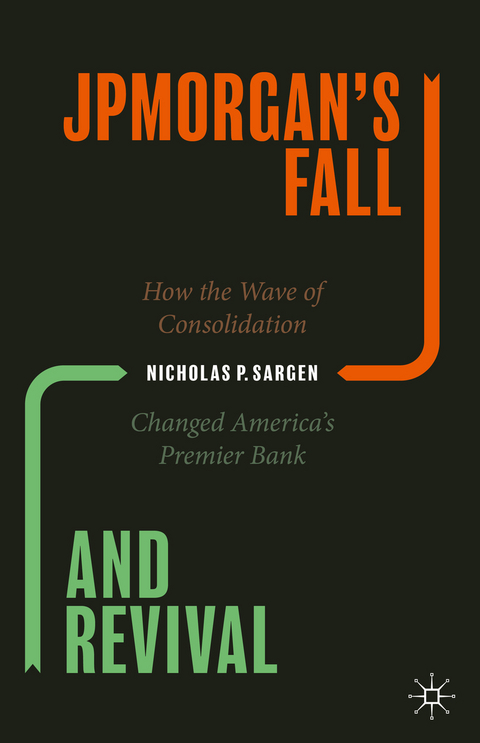
JPMorgan’s Fall and Revival
Springer International Publishing (Verlag)
978-3-030-47057-9 (ISBN)
This book tells the untold story of how JPMorgan became a universal bank in the 1980s-1990s and the events leading to it being acquired by Chase in 2000. It depicts the challenges Morgan's leaders - Lew Preston and Dennis Weatherstone - confronted when the firm's business model was disrupted by the developing country debt crisis and premier corporate borrowers increasingly accessing capital markets, up to its current management with Jamie Dimon. It depicts what happened to Morgan in the larger story of U.S. banking consolidation.
As Morgan sought to re-enter the world of securities and navigate around Glass-Steagall barriers, their overriding goal was to ensure it would remain a pre-eminent wholesale bank serving multinational corporations. Opportunities to grow through acquisition were presented and considered, including purchasing a stake in Citibank in the early 1990s. However, Preston and Weatherstone were reluctant to integrate areas unfamiliar to Morgan such as retail banking or to assimilate cultures that were disparate from the firm's.
This first-hand account explores whether Morgan could have stayed independent had its leaders pursued the strategic plan that called for it to make targeted acquisitions in areas where it had well-established businesses. Instead, in the mid-1990s, it went from being the hunter to the hunted. Rival banks that had been burdened by bad loans to developing countries and commercial real estate capitalized on rising share prices during the tech boom to acquire other institutions. Meanwhile, Morgan's profits and share price lagged, which left it vulnerable.
During this time, all of the leading financial institutions struggled to change their business models. In the end, no U.S. money center bank was able to become a universal bank on its own. What ensued was a growing concentration of financial assets in a handful of institutions that was the precursor to the 2008 financial crisis, which is explored further using Morgan as a lens, in a book that is sure to interest banking and Wall Street professionals and business readers alike.
Nicholas P. Sargen is an international economist turned global money manager. He has been involved in international financial markets since the early 1970s, when he began his career at the U.S. Treasury and the Federal Reserve. He subsequently worked on Wall Street for 25 years, holding senior positions with Morgan Guaranty Trust, Salomon Brothers Inc., Prudential Insurance and J.P. Morgan Private Bank. In 2003 he became Chief Investment Officer for the Western & Southern Financial Group and its affiliate, Fort Washington Investment Advisors Inc., where he now serves as an economic consultant. Sargen has written extensively on international financial markets, and he currently produces a blog on Fort Washington's website, where his views are updated. He appeared frequently on business television programs throughout his career on Wall Street, and was a regular panelist on Louis Rukeyser's Wall Street Week. He was born and raised in the San Francisco Bay Area, and received a PhD in Economics from Stanford University.
Part I: Glory Days.- 1. 23 Wall Street.- 2. A Private Club.- 3. Preston in Charge.- 4. Market Shocks.- 5. Crisis Erupts.- 6. Time to Say Goodbye.- Part II: Formulating the Plan.- 7. Origins of Morgan's Transformation.- 8. Buy or Build?.- 9. Industry Shakeup.- 10. Should Morgan Rescue Citi?.- 11. Preston's Legacy.- 12. Preston Passes the Baton.- Part III: Executing the Plan.- 13. Taking Stock Plans for the Early 1990s.- 14. Risk Management and Derivatives.- 15. Strategic Challenges.- 16. A Chance Encounter.- Part IV: Playing Defense.- 17. 9W 57.- 18. Technology and the New Economy.- 19. Three Ring Circus.- 20. Market Frenzy.- 21. The Managing Directors' 2000 Convocation.- 22. Why Morgan Matters.
"Sargen's book is an engaging memoir, a brisk roundup of decades of banking history and a case study of management adjusting to change." (Dean Anason, American Banker, americanbanker.com, March 31, 2021)
| Erscheinungsdatum | 24.10.2020 |
|---|---|
| Zusatzinfo | XV, 236 p. 5 illus. in color. |
| Verlagsort | Cham |
| Sprache | englisch |
| Maße | 155 x 235 mm |
| Gewicht | 501 g |
| Themenwelt | Geschichte ► Teilgebiete der Geschichte ► Wirtschaftsgeschichte |
| Wirtschaft ► Allgemeines / Lexika | |
| Wirtschaft ► Betriebswirtschaft / Management ► Finanzierung | |
| Wirtschaft ► Betriebswirtschaft / Management ► Unternehmensführung / Management | |
| Schlagworte | Banking consolidation • Banking M&A • Banking transformation • Bank Management • Bank mergers • Debt Crisis • Jamie Dimon • jp morgan • JP Morgan Chase • Universal bank • U.S. Banking • U.S. bank mergers • U.S. financial history |
| ISBN-10 | 3-030-47057-1 / 3030470571 |
| ISBN-13 | 978-3-030-47057-9 / 9783030470579 |
| Zustand | Neuware |
| Informationen gemäß Produktsicherheitsverordnung (GPSR) | |
| Haben Sie eine Frage zum Produkt? |
aus dem Bereich


